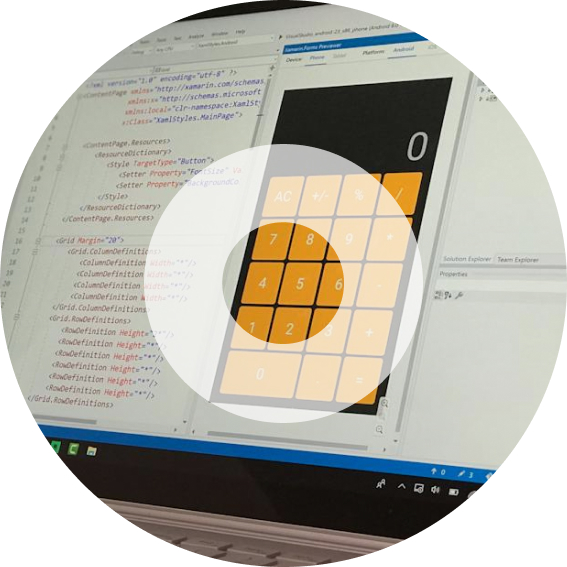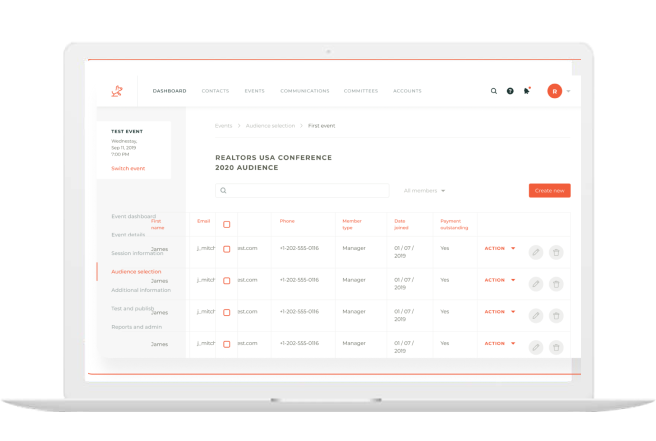Mobile Application Development:
Start Strong to Finish Stronger

Mobile apps are hot right now. And with good reason: they can be a masterful tool to engage and connect with your audience and grow your business in a way that works for everyone.
But when you’re just entering the world of mobile application development, it can all feel a bit overwhelming. How can you be sure your idea is good enough? How should you go about building it? What will it take to really get your app off the ground and pick up the steam you hope and dream about? Do you need the help of a mobile application development agency? And what about professional mobile application maintenance services to keep your app going strong?
Well, those are all great questions. And you’re in the right place to find answers. Let’s take a deeper dive into what I’ll call our “Mobile Application Development Service 101 Crash Course.”
I could go on for hours, but I’ll keep it tight and go over key considerations, including:
- What mobile apps are and how they differ from web apps
- The different types of mobile apps
- The pros and cons of building a mobile app
- A high-level overview of the mobile app development process
- How to find the right mobile application development service to help build your golden app (and why it should be Dazlab!)
What is a mobile application?
A mobile application, also simply called an app, is a software program designed specifically for use on mobile devices like smartphones and tablets. These apps are tailored to play on the unique features of mobile platforms, which lets users take advantage of a full range of functionalities, from productivity tools to entertainment to social networking. If you can dream it, there’s probably an app for it (or will be, if you have anything to say about it!).
Here’s just a small glimpse of what mobile applications can be used for:
- Social networking
- Entertainment
- Camera and photography
- E-commerce
- Utilities
- Business and productivity
- Health, fitness, and nutrition
- Finance
- Travel and navigation
- Education
- News and information
- Augmented reality (AR) and virtual reality (VR)
- Productivity
And that’s just the beginning! It really is the Wild West out there, in a sort of magical and intimidating way.

Mobile applications vs. web applications
Some people use the terms mobile app and web app interchangeably, but there are some key differences, namely in the functionality and deployment.
A mobile application is a standalone software that’s installed on a user’s device, offering optimized performance and access to device-specific features. On the other hand, web applications operate within a web browser, allowing users to access them through the internet.
While mobile apps excel in performance and offline capabilities, web apps boast cross-platform compatibility and easy updates. The choice between them depends on several different considerations, like project requirements, user experience goals, development costs, and the need for specific device features.
If you’re foggy on where you fit in on this spectrum, consider linking up with an expert mobile application development agency (ahem, like Dazlab!). We’ll be able to walk you through your options and weigh them against your needs.

Types of mobile applications
There are a few key types of mobile applications with different development approaches and cycles. It’s important to know which one you want before development starts so you can make sure everything goes as smoothly as possible. Your mobile app development company can help with this, if that’s the route you decide to go.
Native
Native mobile applications are specifically designed and developed for a specific operating system, like iOS or Android. Native apps offer high performance and seamless integration with the unique features of the devices they’re built for, like platform-specific tools and languages. At the end of the day, this means a tailored and optimized experience for your users.
Hybrid
Hybrid mobile applications combine elements of both native and web development. They’re built using web technologies like HTML, CSS, and JavaScript, then encapsulated within something fancy called a “native container.” This container makes it so that the code can be reused across multiple platforms, which ultimately streamlines development efforts and reduces costs.
Cross-platform
Cross-platform mobile applications are designed to run on various operating systems with a single codebase. Frameworks like React Native and Flutter help create apps that keep a native look and feel while maximizing the efficiency of the code. This approach can be ideal if you’re trying to reach a broad user base swiftly and with less development.
Progressive web app (PWA)
Technically a progressive web app (PWA) is a type of web application, but I think it deserves a shout out here too. (If you want to learn all about this type of app, check out our dedicated web application development page here.)
PWAs offer a unique approach: they deliver a native-app-like experience through a web browser. They take advantage of modern web capabilities to offer features like offline functionality, push notifications, and responsive design. PWAs can be accessed through a URL, which eliminates the need for installation through an app store.
Pros and cons of building a mobile app
As with anything in life, mobile apps come with both advantages and disadvantages, which is why our mobile development agency doesn’t say these apps are right for everyone. It’s important to evaluate these ups and downs as you consider whether or not mobile application development is the right move for your unique business needs.
Pros of mobile app development
Enhanced performance:
If you’re going native, these apps are optimized for specific platforms, which means they can use the full range of device capabilities. This means superior performance compared to web apps, especially in terms of speed and responsiveness.
Access to device features:
Native mobile apps can fully leverage device-specific features, like cameras, GPS, accelerometers, and sensors. This means you can create more sophisticated and feature-rich applications, making the user experience sexier and more seamless.
App store visibility:
Publishing on app stores boosts your visibility, making it easier for users to discover and download your app. App store platforms like Apple App Store and Google Play are centralized marketplaces, making marketing and distribution smooth like butter.
Offline functionality:
Depending on the type of build, mobile apps can store data locally on the device, so that users can access certain features or content even when they’re offline. This is a huge advantage over web apps, as your users won’t suffer from internet connectivity issues.
Cons of mobile application development
Platform-specific development:
If you’re building a native app, it will require separate development for each platform, like iOS and Android. This requires more development time and more money. If you have a good development team, you can tackle this on your own. Otherwise, you’ll need to look to mobile application development agencies for help.
Maintaining multiple codebases also requires additional resources for things like updates and bug fixes. (Of course, you can alleviate some of these woes by going hybrid or cross-platform.) Here again, you may need to hire out for mobile application maintenance services.
Approval processes:
Submitting an app to app stores involves a review and approval process, which can be time-consuming. Any delays in approval can impact your app’s release schedule and, unfortunately, lead to missed opportunities.
Limited cross-platform compatibility:
If you’re going native, you’ll find that native mobile apps’ cross-platform compatibility is limited. Separate versions need to be built for iOS and Android, potentially excluding users on less dominant platforms. (Again, you can make life easier in this regard by going hybrid or cross-platform.)
User acquisition challenges:
While app stores provide a nice boost in visibility, they also host tons and tons of competing apps. Standing out and snagging users can be challenging, which means you’ll need to up your marketing and promotion game.
The mobile app development process in a nutshell
Idea generation
Every great app begins with a simple idea. Picture this: You’re at a coffee shop, and it strikes you — why isn’t there an app to order and pay ahead, skipping the line? That’s how it starts. You spot a daily hassle and think, “Hey, I can fix this with an app?”
Strategy and understanding competition
Monetization
Getting the word out
The MVP and first step
Designing the user experience
Creating the visuals
Choosing the right tools
Finding a home for your app
Building the app
This part of the development process is characterized by:
Front-End: This is the part users see and interact with. Like the dashboard of a car, it needs to be intuitive and user-friendly.
Back-End: The powerhouse of your app. It’s all the tech stuff—servers, databases—that make sure your app runs smoothly and securely.
Deployment
Monitoring and updates
Continuous improvement
That’s the journey of app development in a nutshell—from a lightbulb moment to a live app in users’ hands.
How to find the right mobile application development service for the job
There are many mobile application development agencies who will be happy to bring your app to life. How do you choose the best one? You want a partner that understands your vision, has the resources to execute it well, and respects the confidentiality of your idea.
Here’s a breakdown of what to consider in choosing the best mobile app development service provider.
Project evaluation
Make sure the mobile app development company gets what you’re trying to achieve. They should grasp your goals and offer technology solutions that match your plan to go digital.
Protecting your idea
It’s vital to keep your app idea under wraps until it’s developed. Insist on a Non-Disclosure Agreement (NDA) with the company. This step protects your idea while allowing you to share details freely.
Checking expertise
The mobile development agency’s skill set is crucial. They should be able to deliver the app features you want. Ask about their approach to features, their experience with cross-platform development, and the technologies they use.
Portfolio review
A company’s portfolio tells a lot about their experience and quality. Check out the apps they’ve previously developed. Download and use these apps to get a feel for their user interface and functionality.
Communication and involvement
Choose a company that values your input in the app development process. Ask about their communication practices, the level of client involvement they expect, and how they handle updates and iterations.
Timeline clarity
Get a clear picture of how long the project will take. Ask about the agency’s current workload and the number of resources they’ll dedicate to your project. Clear timelines help avoid unexpected delays.
Design focus
An app isn’t just about functionality—its design and user experience are equally important. Ask mobile app development company candidates about their approach to app design. Request to see examples of their work.
Post-launch support
Find out about development companies’ policies for app store submission and post-launch support. Look for someone who offers mobile application maintenance services to include support for updates, bug fixes, and the addition of new features as needed.
Pricing transparency
Last but not least, talk about pricing. It should align with your budget and the scope of your project. Remember, the cheapest option isn’t always the best when it comes to quality and reliability.
Why choose Dazlab for mobile application development?
At Dazlab, we take a unique approach to mobile app development services. We focus on understanding your business, the market, and your customers’ needs. This approach helps us create mobile apps that are impactful and tailored to your audience.

An expert team

Fast-track to the market

Personalized Service
We’re not some big company that will woo you, then assign you to a second-tier program manager. We’re big enough to offer all the features, but not so big that we can’t interface personally with you at every step to make sure you’re getting just what you need and can afford.

Performance you can measure

Quality that’s affordable

A decade of dominance

Advanced tech

Our service spectrum
- Engaging experiences: We don’t just design apps. We design experiences. Think sleek, user-friendly, and engaging.
- Robust development: From start-ups to big players, we develop apps that resonate with your audience.
- Integration and modernization: Need your app to play nice with your existing systems? Or a facelift for your old app? We’ve got you.
Our philosophy
- Open and honest: We keep things transparent. With every decision and every step, you’re in the loop.
- Partnership at its core: We’re in this together. Your challenges are ours. We adapt, solve, and succeed with you.
- Smart solutions: Why reinvent the wheel? We find tools that work, saving time and hassle. If it doesn’t exist, we build it.
- Simplicity is key: We break down the complex. Our process, tools, and interactions are famously straightforward.
- Creative problem solving: Expect out-of-the-box solutions that hit the mark every time.


Don’t underestimate the power of the right mobile application development agency
Maybe your head is spinning right now. Or maybe all this content was just a reiteration of all the basics you already know. Regardless, it all comes down to the development process.
Have you done your due diligence to validate the mobile app idea in the first place? Do you know the core features and functionalities to build out first, so you can test them in the market before building out the big dog version with all the bells and whistles? Do you have a strong, research-based, long-term growth strategy to make sure you can keep the momentum after your initial launch?
And most importantly: do you have the right mobile application development agency to fill in all the gaps in your knowledge and power you to the win?
Dazlab can help you with all of the above. Bring us your vision for your mobile app, and we’ll make it a reality for a reasonable rate and with minimal hassle for you.
What Our Clients Are Saying
